Community News
Families Keep Their Pets in Domestic Violence Shelters, Thanks to Urban Resource Institute

by Fern Gillespie
While heading Urban Resource Institute’s (URI) domestic violence shelter program as senior vice president, attorney Jennifer White-Reid would hear tragic tales from families forced to abandon their pets to flee for safety. URI, a multicultural social service agency headquartered in Manhattan, is the largest provider of domestic violence shelter services in the U.S. and operates shelters throughout New York City. Inspired by the importance of pets in healing trauma, in 2013, White-Reid developed URI’s innovative People and Animals Living Safely program (PALS), which allows domestic violence survivors and pets to stay and heal together.
“We currently operate 14 domestic violence shelters throughout the city. We have the capacity to offer up to 1,500 adults and children services on any given night,” White-Reid, now Chief of Staff and Senior Advisor to the URI CEO, told Our Time Press in recognition of National Domestic Violence Awareness and Prevention Month. “Pets are not just family they are confidants. They are devoted companions. They are protectors. “

To celebrate PALS’s 10th anniversary, this May, URI opened the PALS Place Pet Haven rooftop garden in Brooklyn. The new Pet Haven is a rooftop garden at PALS Place, a seven-story, domestic violence shelter offering 30 -pet-friendly units, along with comprehensive programs and services for people and pets. Families have cats, dogs, turtles, fish, birds, hamsters, guinea pigs and even lizards. The PALS Place can accommodate 100 adults and children at any given time in apartment-style units. It also offers therapy groups, and educational workshops; a recreation room for children and adults, computer access, and childcare playrooms.
“We learned that up to 48% of victims of domestic violence would delay leaving a dangerous situation because they feared for the safety of their pets,” explained White-Reid, who is a Brooklyn resident. “Over 67 percent of American households have at least one pet. Pets often witness domestic violence or are victims themselves. We realized that it was important to design and implement a program where the safety of the entire family was a priority.”
In 2021, URI partnered with the National Domestic Violence Hotline to develop the PALS Report and Survey: Breaking Barriers to Safety and Healing. This insightful report and survey examined the importance of pets to domestic violence survivors. Its results included: 86 percent of domestic violence survivors say their pets provide emotional support; 76 percent reported notable changes in their pet’s behavior as a result of abuse; 91 percent said their pets are significant in their ability to survive and heal from trauma and 29 percent said abusers had actually harmed, hurt or killed their pets.
“At the PALS Place Pet Haven rooftop, clients have shared that feeling of being at peace despite the crisis that they experience,” said White-Reid. “Having these added features in our shelter where they can sit quietly and play with their pet and children or read a book and enjoy the fresh air knowing it is surrounded by nature. Where they can sit and take stock of what’s going on in their life. Like what are the needs of the family and how can they all can be safe.”
URI, which has multicultural leadership, is under the direction of Nathaniel Fields, CEO, one of the few African Americans heading a top New York City social service agency. URI was established 40 years ago, its current services include programs for developmental disabilities, domestic violence services, abusive partner intervention, crime victim services, legal education advocacy, economic empowerment, relationship abuse prevention, and homeless families.
“Our mission is empowering individuals, families and communities, particularly communities of color and other vulnerable populations,” said White-Reid. “Communities of color are disproportionately affected. Black females are particularly adversely impacted by domestic violence. The economic strain, high rates of unemployment, also the stigma surrounding domestic violence make it very challenging for survivors in the community to seek help. To share their stories.”
For information on Urban Resource Institute programs contact: www.urinyc.org













